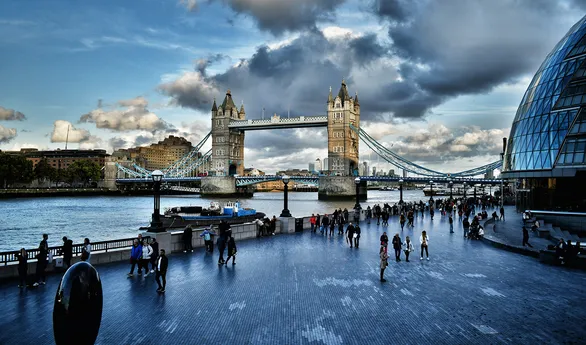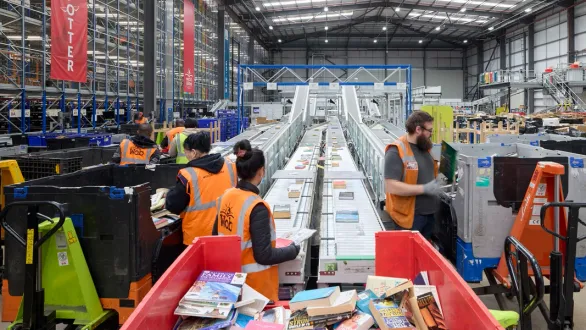From leading your green transition to navigating new carbon reporting standards, COP26 is set to impact your business. So how can you make the most out of COP26 and take the lead on your climate journey? Here’s our rundown.
COP26 matters more this year for companies than any other year before: it’s the first time public and private actors have voiced their commitments to achieving net-zero targets together.
Many companies have made climate pledges to do more for the planet and they will be included in governments’ net-zero plans. As it stands, less than 10% of the world’s biggest listed companies are operating in a way that prevents the world’s temperature from going above 1.5C.
Yes, there has been progress on climate change. But not nearly enough. We’re running out of time. That’s why COP26 is all about stirring up climate actions. Current estimates say that we are moving towards a 2.9C of warming by 2100 , which will bring a series of climate disasters and disruptions to our personal lives and the way we do business.
We – the business builders – are set to play an active role in the green transition. Here’s what to pay attention to in COP26’s discussions:
Governments will count on you to achieve their ambitious net-zero targets
Governments are ready to move the needle to solve the climate crisis – and will ask businesses to take responsibility for their direct and indirect climate impact. In terms of carbon emissions, businesses are the third-largest emitter in the UK after transportation and energy supply industries.
Last week, New Zealand passed the “world’s first law” that requires financial institutions to disclose and take action on their climate risks and opportunities. This summer, France and Switzerland also announced similar plans to make climate disclosures mandatory.
But there won’t be all stick – there will be carrots too, in the form of green incentives. From low carbon taxes to carbon credits, some governments have started to support companies in their business transition.
This will also bring new opportunities to explore new markets, partnerships and foster sustainable innovation. Once a rival to BP and ExxonMobil, Ørsted’s shift from fossil fuel to wind energy has accelerated its profitability and valuation . This is one of the many examples that “going green” leads to better business performance.
Jumping on the sustainability wagon now will make your company more resilient to the green economy transition and grow your business.
Key development to watch:
The event will push governments to raise their climate ambitions. Your government’s Nationally Determined Contributions (NDCs) , which is a national action plan for reducing climate impact, will give you an idea of what’s coming.
COP26 will help businesses anticipate new climate regulations
COP26 will be a catalyst to a series of sustainable regulations that will bring an equal set of opportunities and challenges. The best way to anticipate them is to start measuring your climate impact as soon as possible.
As our CEO Rachel Delacour said: “Reporting on carbon emissions regularly and precisely is your best weapon to anticipate regulations, adjust your strategy, and show the sincerity of your climate pledges.”
That’s why many companies have echoed governments’ net-zero pledges. They can’t miss the green transition if they want to survive. But changing their internal operations will be complex, so they’ve started looking into it before governments start whispering regulations into their ears.
are demanding clearer ways to measure and report on their carbon footprint – and it’ll be interesting to see how the private sector will help shape new standards during and after Glasgow.
Key development to watch:
The International Financial Reporting Standards has been talking about setting up a new article sustainability standards board. And COP26 could provide the momentum it needs.
COP26 is a show of climate leadership for you and your competitors
These days, you are scrutinised by your customers, watched by your investors, questioned by your employees. That’s why taking leadership on your sustainability journey will make you stand out.
In 2020, Microsoft made headlines after pledging to become carbon negative by 2030. A year on, it says it’s already reduced emissions by 6% and funded 26 climate projects that are set to remove 1.3 million metric tons of carbon.
Not only will your climate actions help build a climate-resilient organisation, but they will also give you a competitive advantage.
Think about it. If none of your competitors have started looking into their carbon emissions, and you come out first with a solid, science-based climate programme, investors and customers will take notice. And if everyone else has done it – and you haven’t – you could face a reputation crisis.
Companies who’ve been playing this game for a while know it. With 70 offices in 50 countries and more than 140+ employees, Google has a massive decarbonisation journey ahead. But it knows it’s important to stay competitive and keep innovating.
Doing business is often compared to chess – and COP26 goes by the same rule. Watch how your competitors position themselves. Stay up-to-date with the rules. Identify your competitive advantage and make a strategic first move. Then, lead with a powerful climate programme.
Key development to watch:
Who says what in your target market and sector. Pay attention to announcements, news coverage and the social media presence of your competitors and industry leaders . 😉
Who knows? Business climate actions could be the missing element to tip the balance on the right side of the climate spectrum. The question is, will you show up for it or run to catch the train in a few years?
We’d love to hear your take on COP26 and how you are approaching it as a business leader. Message us or let’s meet in Glasgow next week. See you there!Hundreds of business leaders




